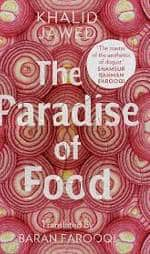



Khalid Jawed, a professor of Urdu at Delhi’s Jamia Millia Islamia, is one of India’s leading Urdu writers with 15 books of fiction and non-fiction to his credit. An English translation of his novel Ne’mat Khana (Arshia Publications, 2014) has made it to this year’s five shortlist for the coveted JCB Prize for Literature. Baran Farooqi, a professor of English and Jawed's colleague at the university, has translated it as The Paradise of Food (Juggernaut Books, 2022). If the book wins, the author will get Rs 25 lakh and the translator will get Rs 10 lakh.

If you are wondering what is special about this book, Jawed has accomplished an almost impossible task — he has written a book about food that will make you lose your appetite. Instead of making the reader gasp with mouth-watering descriptions of delicacies, he evokes disgust. This is completely intentional. His references to food are peppered with commentaries on gluttony, indigestion, diarrhoea, vomiting, farting, and belching. He writes about a kitchen that is not filled with aromas and flavours but ants, cockroaches, and lizards.
The novel is set in “a middle-class Muslim joint family”, and the narrative voice belongs to Hafeezuddin Babar, who is lovingly called Guddu Miyan. You will get to know his mind intimately, perhaps more than you asked for, because he is hell-bent on tracing his journey since childhood until the present moment when he is distraught and a bit disoriented. He is obsessed with the grim and the grotesque, and cannot help pouring his heart out to the reader.
Jawed has created a protagonist who is blessed, or rather cursed, with a “sixth sense” whereby the rumblings in his intestines whisper a secret knowledge into his ear. Owing to this ability, he can predict events that cause trauma and terror to others. He believes that he is not only foreshadowing these events but setting them into motion. You will have to read the book to find out how this happens but it is important to note that Jawed’s story intersects with the story of India as a nation, and it also raises questions about the place of Muslims in it.
This book touches upon a variety of themes, such as loneliness, sexual violence, and mental health, all of which lead back to hunger as a reality and a metaphor. Jawed writes, “If there is one universal languages in the world, it is hunger.” In this book, you will meet necrophiliac sadhus who visit cremation grounds looking for corpses, a swarm of bees attacking a couple engrossed in sexual intercourse, frustrated hostel students discussing human excrement used as manure to grow cauliflowers, and reptiles from overflowing drains entering the house.
The author enjoys watching people, and is able to create both serenity and hilarity using his observations. In his book, you will meet people enjoying the camaraderie of fasting together during the holy month of Ramzan, and people gobbling up food at weddings without even chewing properly. He writes, “The moment the serving dish was placed on the table, everyone jumped to grab the better pieces of mutton or the rich oily gravy.” In this novel, pleasure is always accompanied by dissatisfaction. People die of poisoned food, and of eating more than they can handle. Some have taste buds that have gone numb due to age but they still continue to wax eloquent about food, and fight over salt and chilli in the kitchen.
This book is not for the squeamish or for those who want to read about how food gets people closer, builds trust, and resolves conflict. The narrator challenges such expectations of instant harmony, and explicitly designates the kitchen as a place of danger and strife. You will meet hot-tempered people who are ready to throw chilli powder into each other’s eyes, and those who have the hidden talent of turning every available object in the kitchen into a potential weapon. In this book, the kitchen is a place where bickering takes place, where plans are hatched to exact revenge, and where people have no qualms about harming each other.
The author also points out how oblivious men are when it comes to the kitchen, conveniently extricating themselves from the labour that it takes to feed themselves and others. They watch from the sidelines as the kitchen turns into a battleground, and women pounce on each other. The narrator’s account might come across as sexist when he writes that women who get accustomed to “lifting hot vessels with their hard, insensitive hands in the kitchen, start behaving in the same way with the pots and pans as they behave with their husbands”.
Pick up this book if you do not mind reading about worms in intestines, people spitting phlegm, lizards falling into boiling milk, and bloodstains that look like korma gravy. The author is commenting on habits of mindless consumption and the decay that seeps into relationships, which become toxic like delicious food does when it rots and attracts flies. He takes delight in elevating the sordid, and gives two hoots about respectability. He succeeds in making us think about food in relation to defecation and disease, pleasure and privilege.
Discover the latest Business News, Sensex, and Nifty updates. Obtain Personal Finance insights, tax queries, and expert opinions on Moneycontrol or download the Moneycontrol App to stay updated!
Find the best of Al News in one place, specially curated for you every weekend.
Stay on top of the latest tech trends and biggest startup news.